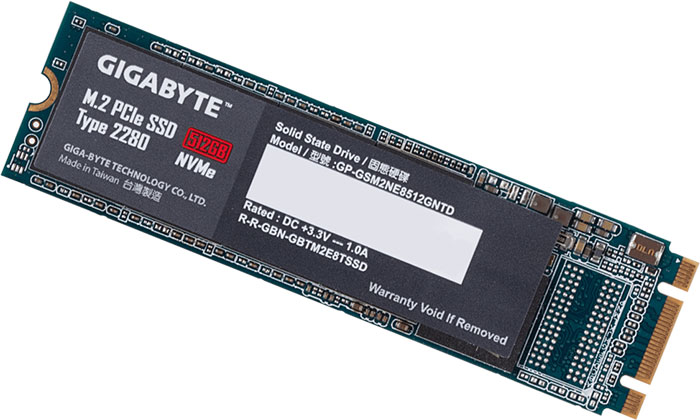Gigabyte's PCIe 4.0 SSD Touts Monstrous 5GB/s Speeds For Ryzen 3000 Zen 2 Motherboards

Companies are getting a jump on Computex by announcing a spattering of upcoming products ahead of the event, which gets underway on Tuesday, May 28. Count Gigabyte among them. One of the things Gigabyte plans to show off is a new solid state, though it's not like any SSD that is currently available. How so?
According to Gigabyte, it's the world's first PCI Express 4.0 M.2 SSD. There is a bit to unpack among all that technobabble, so lets get started.
M.2 refers to the form factor. Unlike 2.5-inch SSDs that require a power cable and SATA cable, M.2 drives are those gum stick-sized SSDs that plug directly into the motherboard, provided it has an M.2 slot. These can be either SATA or NVMe. An example is shown at the top of this article (it's one of Gigabyte's existing M.2 SSDs, and not the one it is announcing at Computex).
The former is a slower interface that tops out at around 550-580MB/s for reads and writes, while the latter shuttles data through the PCI Express bus at potentially much faster speeds. For example, Samsung's blazing fast 970 Evo Plus SSD is rated to deliver sequential read and write speeds of up to 3,500MB/s and 3,300MB/s, respectively.
The advent of PCIe 4.0 support on motherboards will usher in a new era of NVMe SSDs with even faster performance, and that is where Gigabyte's announcement comes into play.
"Gigabyte one of the very few computer tech companies to design workstation grade motherboards that are compatible with NVIDIA’s Quadro graphics cards for professional individuals. At Computex, Gigabyte also releases the world’s first PCIe 4.0 interface M.2 SSD on the latest AMD platform to provide video editors with 5,000MB/s read/write speeds in low temperatures," Gigabyte said.
Therein lies one of the benefits of PCIe 4.0—more bandwidth (double that of PCIe 3.0) for potentially faster speeds. Here's how the theoretical transfer speed breaks down with each generation of PCIe:
- PCIe 1.0: 2.5GT/s
- PCIe 2.0: 5GT/s
- PCIe 3.0: 8GT/s
- PCIe 4.0: 16GT/s
The timing of Gigabyte's announcement is not a coincidence. AMD is getting ready to unveil new Ryzen 3000 series desktop processors based on its 7-nanometer Zen 2 CPU architecture. It has a keynote scheduled for Computex, presumably for that purpose. AMD will also introduce a new X570 chipset featuring PCIe 4.0 support.
Summed up, faster and exciting things are coming. That said, it's interesting that Gigabyte specifically pointed to "low temperatures" for its performance claim. Only hands-on testing will reveal how quick Gigabyte's upcoming SSD is to throttle, and what kind of impact that will have on performance. In other words, stay tuned.

